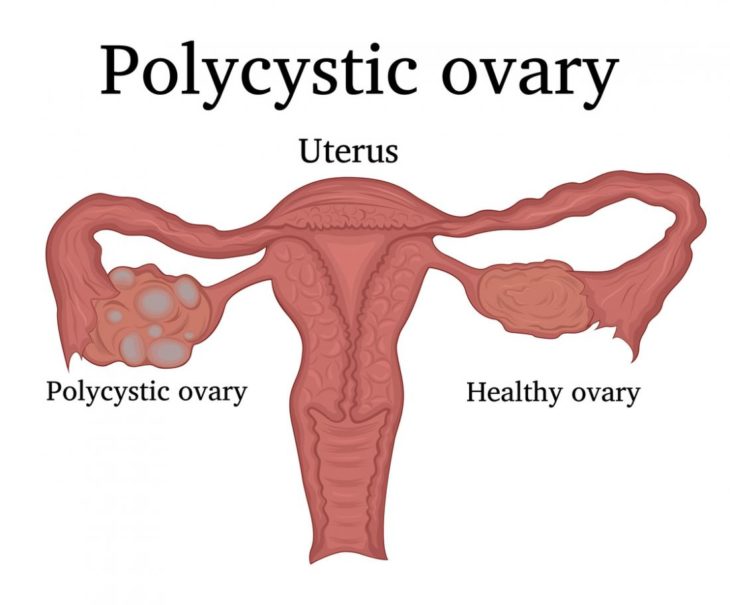Fact #1: I am a woman. I have boobs, ovaries, fallopian tubes and, well, a place down under. I have had the joy (yes, that’s sarcasm) of a regular period since high school.
Fact #2: I’ve never had sex. I graduated from college last week, but I’ve still never been in a relationship that’s gotten to that point.
Which was why, after six months without a period during the summer between my freshman and sophomore years of school, I started asking myself if I was pregnant and how it could be possible. Did I drink too much one night and not remember hooking up with someone? Or was I a victim of sexual assault but had repressed the memory to the back of my brain? I was terrified of what was going on in my body, but I didn’t know what to do about it. After all, I had finished only a year of college and couldn’t handle having a kid.

Source: medicalnewstoday.com
What scared me most about PCOS was my complete lack of knowledge of the disease. I’d never even heard of it before. Hearing the endocrinologist say the words “ovaries,” “cysts,” and “infertility” terrified me.
Luckily, I was not pregnant. I was not the Virgin Erin, and my unborn child was not the second coming of Christ. When I came home from a summer job, my mom suggested I see my doctor about my medical issue and said the doctor referred me to an endocrinologist. After asking me a few questions and taking a few tests, he determined that I had PCOS or poly-cystic ovarian syndrome.
PCOS, also known as Sclerocystic Ovarian Disease, Stein-Leventhal Syndrome, Chronic Anovulatory Syndrome, and Polycystic Ovarian Disease (PCOD), is the most common female hormonal disorder. Five to 10 percent of women are affected by PCOS, and it is one of the leading causes of infertility. It is characterized by multiple abnormal cysts on the ovaries, which are usually harmless, fluid-filled sacs containing immature eggs. However, some may pop with physical excursion and could lead to intense abdominal pain. Multiple cysts with the appearance of a “string of pearls” are a common sign of PCOS. Abnormal weight gain, irregular periods, and even psychological issues like depression and anxiety can also be symptoms of PCOS.
After my doctor finally confirmed for me what was going on in my body, it led to some heavy self-evaluation. What scared me most about PCOS was my complete lack of knowledge of the disease. I’d never heard about it before until I went to the endocrinologist. Hearing him say the words “ovaries,” “cysts,” and even “infertility” terrified me. See, I have always been the type of person who needs to eventually have children. Yes, adoption is always an option, but I want a child of my own one day—someone who looks like my husband and me and who came from my eggs. To hear a doctor tell me that it might not be possible made me sick to my stomach.

Source: Medical News Today
I asked about treatment options. The first option: birth control. I was never on it before because I’d never needed it. My doctor explained that taking it would not be fixing the problem—more like just putting it on the back burner. I would begin getting regular periods, and at the same time, I would also be preventing pregnancy if I decided to have sex, so I was all for BC. My mother, on the other hand, was not. We’re Catholic, and she doesn’t believe in birth control. She wanted to hear about other options.
Which there were: metformin. Metformin is a pill you take once a day that tells your ovaries to menstruate at the correct time. I was all for regular periods! Feeling normal! Yay! But there were some drawbacks. If you miss a pill for a few days, your ovaries get off track and you might not have a period for a few weeks, or you can get it twice in a span of two weeks. Another issue: metformin actually promotes pregnancy, so if I were to have sex, I would need to be very careful. Still, I decided to go for this. As long as I stay on it, my ovaries will work well enough to feel normal.
Before I was diagnosed with PCOS, something really bothered me that I wouldn’t have guessed. I didn’t feel feminine. This may sound strange, but without my period, I felt like less of a woman. When we’re teenagers, we don’t want people to know we have our periods. We want to strap our boobs down, and we won’t even mention the hair under our armpits. But as we grow into women, we get used to the usual cycle and we even embrace it: This is what happens so we will have children, so we can procreate and continue this race.
Without my period, I felt useless. Why wasn’t I a normal woman? One reason I felt this way was because of my high level of testosterone—a normal side effect of PCOS. Being a woman meant dealing with the frustrations of cramps, bloating, buying tampons and pads, and discussing it with your friends. Though, not having to deal with it sounds like a blessing, not having all that sucked. It felt like something was wrong with me. I began to doubt my body and even my future. Would I ever have kids? Could my body handle it? Would I be a fit home for any fetus?
Source: ccrmivf.comEver since I was diagnosed with PCOS, my outlook on my body and its fantastic reproduction system has changed. I used to take it for granted, just assuming that one day I would have children without a problem. But once I realized how difficult it might be for me, I began taking better care of my body. I also realized how many women are affected with PCOS. After I told my friends about it, I found that not only did my best friend have it, but she has a much more severe case: She has large cysts on her ovaries that pop and send her into intense amounts of pain. I also have a few other friends with PCOS who are either on metformin or birth control.
Today, I am confident in my choice of treatment for PCOS. I hope that by taking care of it now, I’ll be able to have children of my own. I take my pill every day and I continue to have regular periods. I also have appointments with my endocrinologist every few months to keep myself up to date with my progress and to make sure I am doing everything right. I don’t want to take any chances with my fertility.
One of the most important issues of PCOS is the lack of information many women have. I didn’t know I had a problem until I was 19. And I took care of it early. PCOS is the leading contributor to female infertility and it can be treated. If you have any doubts, get tested by a doctor: It’s non-invasive and easy to treat. There’s even an online test you can take here to see if you are at risk. The more knowledge that is spread, the less women with this disease will hurt. I’m trying to live a normal life with PCOS, and others can do the same.
Original by Erin Daly
